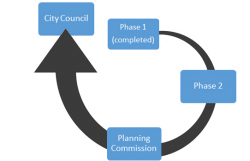Project Phases
Phase 1: Technical Analysis
Winter 2020 through June 2021
To complete Phase 1, the City secured grant funding from the Department of Land Conservation and Development (DLCD) to contract with consultant (MIG, Inc.) to conduct the technical analysis. That work included a code audit to identify actions the City will need to take to comply with HB2001 and a community survey to gauge interest in going beyond minimum compliance. The consultant team’s work was completed in June 2021. The outcome was recommended comprehensive plan and code changes to comply with the rules of HB2001 as well as some policy questions to address during the public engagement process.
Phase 2: Public Engagement and Code Adoption
July 2021 through June 2022
The purpose of Phase 2 engagement will be to get community feedback on policy choices and programs that could help promote the development of middle housing types in the community. That feedback will be used to help decision-makers determine whether the City adopts the minimum to comply with HB2001 or adopts code language to implement some of the policy choices. Using the consultant’s recommended Community Development Code amendments, the City will be able to edit the code language as necessary to better fit the community’s needs and state laws through the engagement efforts and outreach.
Community outreach will take place and drafts of the code amendments will be shared with the public, allowing for the opportunity to provide input on the draft amendments.The final action of Phase 2 will be adoption of Community Development Code amendments. This includes public hearings by both the Planning Commission, who will provide a recommendation, and City Council, who makes the final decision on the amendments that are adopted. This phase will focus on community engagement, public hearings, and the adoption process necessary to meet the State mandated adoption deadline of June 30, 2022.

